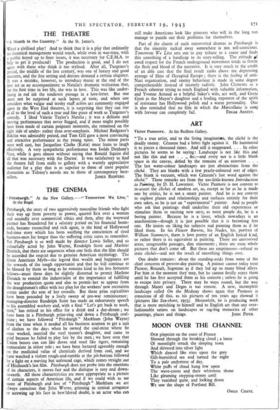THE CINEMA
- Pittsburgh." At the New Gallery. " Tomorrow We Live."
At the Regal.
Pittsburgh, the story of two aggressively masculine friends who fight their way up from poverty to power, quarrel first over a woman and secondly over commercial ethics and then, after the wayward partner has floundered for a salutary period on 'his financial beam- ends, become reconciled and rich again, is the kind of Hollywood bed-time story which has been soothing the consciences of tired business-men for longer than the suffering critic cares to remember. Yet Pittsburgh is so well made by director Lewis Seller, and so colourfully acted by John Wayne, Randolph Scott and Marlene Dietrich, that there are sequences when one feels that the film should be accorded the respect due to genuine American mythology. The Great American Myth—the legend that wealth and happiness are the rewards of the tough opportunist and that he will continue to be blessed by them so long as he remains kind to his less fortunate fellows—must these days be slightly distorted to permit Marlene Dietrich to remind the industrialist of the importance of fulfilling the war production quota and also to permit. her to appear from the draughtsman's office with her plan for the workers' new recreation centre under the arm of her overalls. But these prim topicalities have been preceded by a lively sweep of pre-war reminiscence: managing-director Randolph Scott has made an exhortatory speech to his assembled workers and, with a final " Let's get back to work, men," has retired to his office for a drink and a day-dream ; we have been in a Pittsburgh prize-ring and down a Pittsburgh coal- mine; we have followed " Pittsburgh " Markham (John Wayne) from the time when it needed all his business acumen to get a suit of clothes to the days when he owned the coal-mine where he once worked, married the steel tycoon's daughter, and came to grief because he failed to play fair by the men ; we have seen that Union bosses can coo like doves and snarl like tigers, remaining immaculate in either role ; we have been lectured agreeably enough on the medicinal value of chemicals derived from coal, and we have watched a violent rough-and-tumble at the pit-bottom followed by a fight on a moving but unfenced cage, which comes straight out of Hitchcock's last film. Pittsburgh does not probe into the emotions of its characters, it moves fast and the dialogue is easy and down- to-earth. All these characteristics are most appropriate to a picture of certain aspects of American life, and if we could wish to see more of Pittsburgh and less of " Pittsburgh " Markham we are always conscious that John Wayne, grinning in cynical arrogance or screwing up his face in bewildered doubt, is an actor who can
still make Americans look like pioneers who will in the long run manage to puzzle out their problems for themselves.
Part of the charm of such extroverted dramas as Pittsburgh is that the sincerity tucked away somewhere is not self-conscious. Tomorrow We Live sets out to .pay tribute to a cause and finds this something of a handicap to its story-telling. The attitude of awed respect for the French underground movement tends to freeze the flesh and blood of the narrative. It is very much to the credit of an able cast that the final result ranks above the depressing average of films of Occupied Europe ; there is the feeling of anti- Nazi organisation, and enemy behaviour is made in some degree comprehensible instead of insanely sadistic. John Clements as a French saboteur trying to reach England with valuable information, and Yvonne Arnaud as a helpful baker's wife, act well, and Greta Gynt as the Mayor's daughter and a leading exponent of the spirit of resistance has Hollywood polish and a warm personality. One is also reminded that no film in which the Marseillaise is sung
with fervour can completely fail. EDGAR ANSTEY.


























 Previous page
Previous page